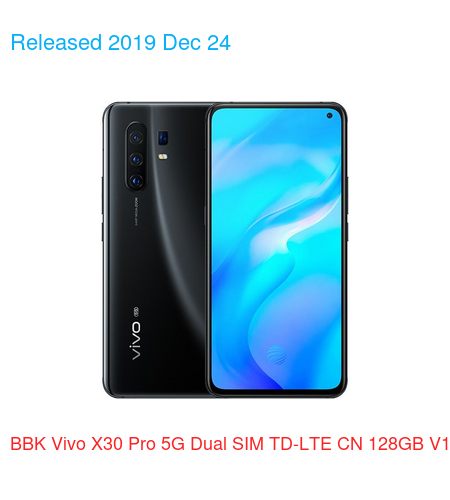| Brand | BBK |
| Model | Vivo X30 Pro 5G Dual SIM TD-LTE CN 128GB V1938T |
| Released | 2019 Dec 24 |
| Announced | 2019 Dec 16 |
| Hardware Designer | BBK Electronics |
| Manufacturer | BBK Electronics |
| Codename | BBK V1938 |
| General Extras | Haptic touch feedback |
| Device Category | Smartphone |
| Width | 74.1 mm |
| Height | 158.45 mm |
| Depth | 8.8 mm |
| Dimensions | 2.92×6.24×0.35 inches |
| Mass | 198.5 g |
| Platform | Android |
| Operating System | Google Android 9.0 (Pie) |
| Software Extras | Voice Command , Navigation software , Intelligent personal assistant , Face Recognition |
| CPU Clock | 2200 MHz |
| CPU | Samsung Exynos 9 Octa 980, 2019, 64 bit, octa-core, 8 nm, ARM Mali-G76 GPU |
| RAM Type | LPDDR4x SDRAM |
| RAM Capacity (converted) | 8 GiB RAM |
| Non-volatile Memory Interface | Yes |
| Non-volatile Memory Capacity (converted) | 128 GB ROM |
| Display Hole | 1-hole |
| Display Diagonal | 163.5 mm |
| Resolution | 1080×2400 |
| Horizontal Full Bezel Width | 7.01 mm |
| Display Area Utilization | 85.2% |
| Pixel Density | 409 PPI |
| Display Type | AM-OLED display |
| Display Subtype | Super AM-OLED |
| Number of Display Scales | 16.8M |
| Scratch Resistant Screen | Yes |
| Graphical Controller | ARM Mali-G76MP5 |
| A/V Out | No |
| Microphone(s) | stereo |
| Loudspeaker(s): | mono |
| Audio Output: | 3.5mm |
| Supported Cellular Bands | GSM850 , GSM900 , GSM1800 , GSM1900 , UMTS2100 (B1) , UMTS1900 (B2) , UMTS1700/2100 (B4) , UMTS850 (B5) , UMTS900 (B8) , CDMA800 (BC0) , TD-SCDMA2000 , TD-SCDMA1900 , LTE2100 (B1) , LTE1900 (B2) , LTE1800 (B3) , LTE1700/2100 (B4) , LTE850 (B5) , LTE2600 (B7) , LTE900 (B8) , TD-LTE2000 (B34) , TD-LTE2600 (B38) , TD-LTE1900 (B39) , TD-LTE2300 (B40) , TD-LTE2500 (B41) , TD-NR2500 (N41) , TD-NR3500 (N78) bands |
| Supported Cellular Data Links | GPRS , EDGE , UMTS , HSUPA , HSUPA 5.8 , HSDPA , HSDPA 7.2 , HSPA+ 21.1 , DC-HSDPA 42.2 , cdmaOne , CDMA2000 1x , CDMA2000 1xEV-DO , CDMA2000 1xEV-DO Rev A , TD-SCDMA , TD-HSDPA , LTE , LTE 100/50 , LTE 150/50 , LTE 300/50 , LTE 300/75 , LTE 600/50 , LTE 1000/100 , NR 2600 , NR 3700 data links |
| SIM Card Slot | Nano-SIM (4FF) |
| Complementary Phone Services | Voice transmission , Voice speaker , Vibrate , Speakerphone , ANC , HD Voice , VoLTE |
| Dual Cellular Network Operation | Dual standby |
| Sec. Supported Cellular Networks: | GSM850 , GSM900 , GSM1800 , GSM1900 , UMTS2100 (B1) , UMTS1900 (B2) , UMTS1700/2100 (B4) , UMTS850 (B5) , UMTS900 (B8) , CDMA800 (BC0) , TD-SCDMA2000 , TD-SCDMA1900 , LTE2100 (B1) , LTE1900 (B2) , LTE1800 (B3) , LTE1700/2100 (B4) , LTE850 (B5) , LTE900 (B8) , TD-LTE2000 (B34) , TD-LTE2600 (B38) , TD-LTE1900 (B39) , TD-LTE2300 (B40) , TD-LTE2500 (B41) |
| Sec. Supported Cellular Data Links: | GPRS , EDGE , UMTS , HSUPA , HSUPA 5.8 , HSDPA , HSDPA 7.2 , HSPA+ 21.1 , DC-HSDPA 42.2 , cdmaOne , CDMA2000 1x , CDMA2000 1xEV-DO , CDMA2000 1xEV-DO Rev A , TD-SCDMA , TD-HSDPA , LTE , LTE 100/50 , LTE 150/50 , LTE 300/50 , LTE 300/75 , LTE 600/50 , LTE 1000/100 |
| Sec. SIM Card Slot | Nano-SIM (4FF) |
| Touchscreen Type | Capacitive multi-touch screen |
| Expansion Interfaces | No |
| USB | USB 2.0 |
| USB Services | USB charging , USB fast charging , USB Host , USB OTG 1.3 , USB PD |
| USB Connector | USB C reversible |
| Max. Charging Power | 33.0 W |
| Bluetooth | Bluetooth 5.0 |
| Wireless LAN | 802.11a , 802.11b , 802.11g , 802.11n , 802.11ac |
| Wireless Services | Wi-Fi Tethering , WiDi |
| NFC | NFC A , NFC B |
| FM Radio Receiver | No |
| Complementary Satellite Services | Simultaneous GPS , A-GPS , Geotagging , QuickGPS |
| Supported GLONASS protocol(s) | L1OF |
| Supported Galileo service(s) | E1 |
| Supported BeiDou system (BDS) | B1I BeiDou receiver |
| Camera Placement | Rear |
| Camera Image Sensor | CMOS |
| Number of effective pixels | 63.7 MP camera |
| Aperture (W) | f/1.80 |
| Zoom | 5.0 x optical zoom |
| Focus | PD AF |
| Min. Equiv. Focal Length | 26.4 mm |
| Flash | single LED |
| Camera Extra Functions | Pixel unification , HDR photo , Red-eye reduction , Slow motion video , Burst mode , Touch focus , Macro mode , Panorama Photo , Face detection , Face tagging , Face retouch , Intelligent scene detection |
| Aux. Camera Image Sensor | BSI CMOS |
| Aux. Camera Number of Pixels | 13.0 MP aux. cam |
| Aux. Camera Aperture (W) | f/3.00 |
| Aux. Cam. Min. Equiv. Focal Length | 135 mm |
| Aux. Camera Extra Functions | HDR photo , Burst mode , Panorama Photo , Intelligent scene detection |
| Aux. 2 Camera Image Sensor | BSI CMOS |
| Aux. 2 Camera Number of Pixels | 8.0 MP aux. 2 cam |
| Aux. 2 Camera Aperture (W) | f/2.20 |
| Aux. 2 Cam. Min. Equiv. Focal Length | 16 mm |
| Aux. 3 Camera Image Sensor | BSI CMOS |
| Aux. 3 Camera Number of Pixels | 32.0 MP aux. 3 cam |
| Aux. 3 Camera Aperture (W) | f/2.00 |
| Aux. 3 Cam. Min. Equiv. Focal Length | 50 mm |
| Aux. 4 Camera Image Sensor | No |
| Secondary Camera Placement | Front |
| Secondary Camera Sensor | CMOS |
| Secondary Camera Number of pixels | 32.0 MP sec. cam |
| Secondary Aperture (W) | f/2.45 |
| Secondary Camera Extra Functions | Pixel unification , HDR photo , Burst mode , Panorama Photo , Face detection , Face tagging , Face retouch , Intelligent scene detection |
| Sec. Aux. Cam. Image Sensor | No |
| Built-in compass | Yes |
| Built-in accelerometer | 3D accelerometer |
| Built-in gyroscope | Yes |
| Additional sensors | In-screen FP sensor , L sensor , P sensor |
| Protection from solid materials | Yes |
| Protection from liquids | Yes |
| Battery | Li-ion polymer (LiPo) |
| Nominal Battery Capacity | 4350 mAh battery |
| Market Countries | China |
| Market Regions | Asia |
| Mobile Operator | China Mobile Limited |
| Added | 2024-06-15 |
Specifications data description of this 📱BBK Vivo X30 Pro 5G Dual SIM TD-LTE CN 128GB V1938T📱
Title: Specification of the Device: A Comprehensive Overview
Introduction
————
In today’s fast-paced world, technology plays a vital role in simplifying our lives. Devices have become an essential part of our daily routine, and selecting the right one can be a daunting task. In this blog post, we will discuss the specification of a device, covering various aspects such as network, launch date, body, display, operating system, chipset, CPU, GPU, memory, camera, sound, communications, features, and battery. So, buckle up, and let’s dive into the world of technology!
Lineup
—–
In recent years, the market has been inundated with a plethora of devices, making it challenging for consumers to choose the right one. Therefore, it is crucial to have a clear understanding of what each device offers.
Design
——
The design of a device plays a critical role in attracting customers. Devices with sleek and stylish designs are often preferred over bulkier ones. Moreover, the build quality and materials used in manufacturing the device are essential in determining its durability and longevity.
Specifications
————–
### 🌐 Network
A reliable network connection is crucial for uninterrupted communication and online activities. Devices with support for various network bands offer better connectivity and coverage.
### 📅 Launch
Knowing the launch date of a device helps consumers plan their purchase accordingly. It also gives them an idea of how long they have to wait before they can get their hands on the latest technology.
### 🏋️ Body
The dimensions and weight of a device are essential factors in determining its portability and ease of use. A device that is lightweight and compact is preferred over a heavy and bulky one.
### 🌈 Display
The display is one of the most critical aspects of a device. It determines the visual experience and is crucial for activities such as gaming, watching videos, and browsing the web. Factors such as screen resolution, refresh rate, and panel type play a vital role in determining a device’s display quality.
### 🤖 OS 🛠️
The operating system of a device determines the user interface and compatibility with various applications. Devices with a user-friendly OS and wide compatibility with apps are often preferred over those with limited compatibility.
### 🚀 Chipset 🔧
The chipset of a device is responsible for its overall performance. A powerful chipset is crucial for smooth multitasking, gaming, and handling demanding applications.
### 💪 CPU 🖥️
The CPU, or central processing unit, is the brain of a device. It determines the speed at which the device processes information and executes tasks.
### 🎮 GPU 💻
The GPU, or graphics processing unit, is responsible for rendering visuals and processing graphics. A powerful GPU is essential for gaming and other graphics-intensive tasks.
### 🧠 MEMORY 🗂️
Memory is crucial for storing data and applications. Devices with ample memory allow for smoother multitasking and faster load times.
### 📷 CAMERA 🎥
The camera is an essential aspect of a device, especially in today’s world. A high-quality camera is crucial for taking great photos and videos. Factors such as resolution, aperture, and image stabilization determine a camera’s performance.
### 🔈 SOUND 🎵
Sound quality is crucial for watching videos, playing games, and listening to music. Devices with high-quality speakers and support for various audio formats are preferred over those with poor sound quality.
### 📡 COMMS 📶
Effective communication is crucial in today’s world. Devices that support various communication protocols, such as Wi-Fi, Bluetooth, and NFC, offer better connectivity and compatibility with other devices.
### 💡 FEATURES 🎁
Unique features and functionalities are often the deciding factor for consumers. Devices with features such as biometric authentication, water and dust resistance, and wireless charging offer a competitive advantage over others.
### 🔋 BATTER
A long-lasting battery is crucial for a device’s portability and convenience. Devices with efficient power management and fast charging capabilities are preferred over those with poor battery life.
Conclusion
———-
In conclusion, selecting the right device requires a comprehensive understanding of its specifications. Factors such as network, launch date, body, display, operating system, chipset, CPU, GPU, memory, camera, sound, communications, features, and battery are critical in determining a device’s value and performance.
We hope this blog post has given you a better understanding of the specification of the device. Now that you are equipped with this information, we invite you to leave a comment and share your thoughts on the topic. We would love to hear your opinions and feedback!














